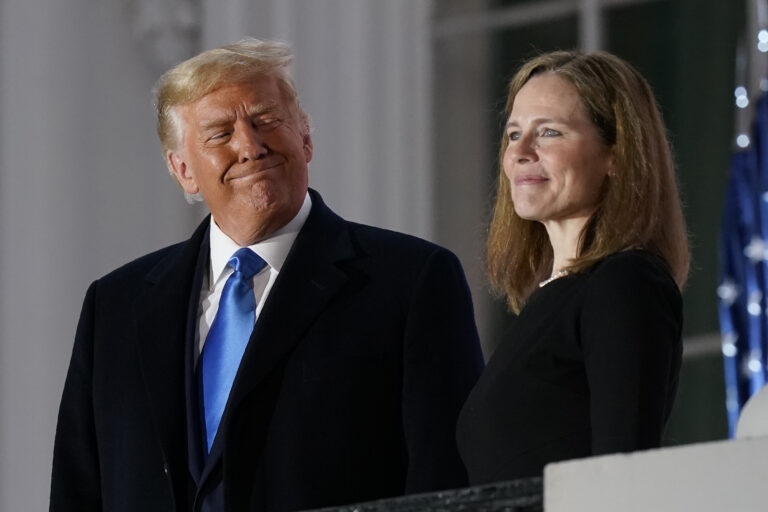No Safe Haven

Margaret Talbot’s fine, twist-the-knife-slowly profile of Amy Coney Barrett has a good discussion of her use of “safe haven” laws to pretend that forcing women to carry pregnancies to term isn’t a significant infringement of personal autonomy:
Barrett devoted more of her time to a line of questioning that was not especially jurisprudential—and not one which any other Justice likely would have pursued. Speaking politely, in her youthful-sounding voice, she began asking about “safe haven” laws, which allow a person who has just given birth to leave the baby—anonymously, with no questions asked—at a fire station or some other designated spot. States began passing such legislation in 1999. (Some legislators found the idea appealing partly because it was about saving babies and partly because—unlike programs that subsidize child care or help beleaguered parents in many other ways—safe havens generally cost little to set up.) Barrett seemed to be implying that such laws posed a feasible alternative to abortion. In a colloquy with Julie Rikelman, who represented Jackson Women’s Health Organization—the only abortion clinic in Mississippi—Barrett noted that safe-haven laws existed in all fifty states, adding, “Both Roe and Casey emphasize the burdens of parenting, and, insofar as you . . . focus on the ways in which forced parenting, forced motherhood, would hinder women’s access to the workplace and to equal opportunities, it’s also focussed on the consequences of parenting and the obligations of motherhood that flow from pregnancy. Why don’t the safe-haven laws take care of that problem?” Pregnancy itself, Barrett went on, might impose a temporary burden on the mother, but if you could relinquish the baby you could avoid the burden of parenthood. And, in a peculiar sideswipe, she described pregnancy as “an infringement on bodily autonomy . . . like vaccines,” a comment that seemingly built on anti-vaxxers’ appropriation of pro-choice rhetoric to make a novel suggestion: that being required by your employer to get a shot against a deadly communicable disease is somehow equivalent to being forced to give birth.
“You libs say that abortion bans violate personal autonomy, but we have vaccine mandates, and isn’t getting a couple of shot just like having to carry a fetus for nine months and then having the responsibility of raising a child when you think about it?”
“Um, not really, but does this mean we can have vaccine mandates?”
As Talbot says, the idea that adoption is a viable alternative to abortion for most people is silly even if we leave the many health risks of pregnancy itself aside (which we certainly shouldn’t!)
A kind of magical thinking animates a belief in these laws as a panacea for unwanted pregnancy. Giving up an infant for adoption is rare in the United States—according to the National Council for Adoption, about eighteen thousand infants are voluntarily relinquished each year. (The Centers for Disease Control and Prevention reports that, in 2019, more than six hundred thousand abortions were performed.) And the number of unmarried teen-agers who carry a pregnancy to term and give the baby up is much lower than it was in the nineteen-fifties and sixties, when safe and legal abortion was not an option. Laury Oaks, a professor at U.C. Santa Barbara who has written a book about safe-haven laws, told me that the first one to pass, in Texas, was called the Baby Moses Law—a name that carried Biblical connotations and conjured an idealized image of noble protectors.
It’s not clear what inspired Barrett’s questions about safe-haven laws. The brief filed by Mississippi in 2021 makes only a passing mention of them, and dozens of amicus briefs filed on behalf of Mississippi don’t cite them at all. But two briefs filed by relatively obscure organizations offer sunny assessments of safe havens as an antidote to abortion. A brief from the Justice Foundation, a Texas-based litigation firm that handles anti-abortion cases, contends that “as a matter of law, there are no more ‘unwanted’ children in America because of the major change in circumstances known as Safe Haven laws,” adding, “Even if states ban or restrict abortions completely, or if only one clinic exists in a state, no woman would have to care for a baby if she does not have the desire or ability to do so.” Reason for Life, a Christian ministry in Palmdale, California, filed a brief arguing that the safe-haven approach “gives loving couples a chance to realize their long-awaited dream of welcoming a baby into their hearts and homes,” while also providing “mothers a way to put childrearing responsibilities behind them almost instantaneously.” The Reason for Life brief is credited, in part, to three lawyers at Boyden Gray & Associates, a boutique firm in Washington, D.C.; one of them, Michael Buschbacher, was a law student of Barrett’s at Notre Dame.
With Roe having less than six months to live — and already having been summarily executed in, natch, Texas — the next stage is going to be the reactionaries responsible for it pivoting to claims that it’s not really a big deal. They won’t withstand any serious scrutiny, but don’t count on the typical reporter being as careful about them as Talbot is.


